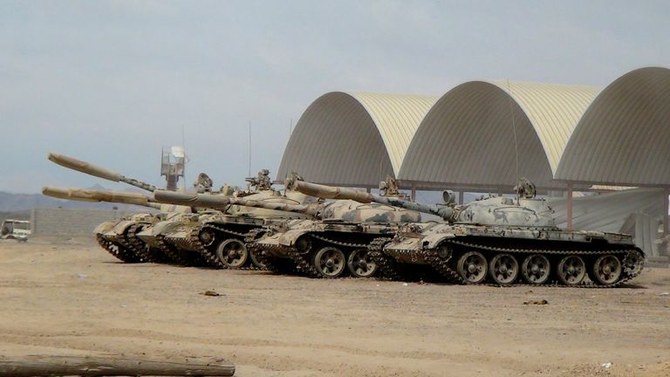Yemen’s deadly attack and Tehran’s regional escalation

https://arab.news/cpxwk
The Houthis’ deadly attack on a military base in southern Yemen was another indication of the ongoing escalation by the movement and its Iranian sponsors. On Sunday, ballistic missiles and drones targeted Al-Anad Air Base, killing and injuring scores of people. Official sources have put the number of dead at about 30, in addition to 60 more injured, but said they were still investigating and the exact figures could be higher.
Also on Sunday, three Houthi drones targeted Khamis Mushayt in southwestern Saudi Arabia. Unlike the attack on Al-Anad, these drones were intercepted and were all foiled. The Saudi-led coalition has recorded more than 1,000 ballistic missile and drone attacks by the Houthis, in addition to nearly 100,000 shorter-range projectiles and hundreds of naval mines. Underscoring their lack of commitment to peace efforts, the Houthis have also committed more than 30,000 violations of the Stockholm Agreement that was concluded in December 2018.
Targeting Al-Anad signifies a new intensification of the Houthis’ war against the internationally recognized government. Yemen’s largest military base, Al-Anad is located about 60 km north of Aden. It was built by the Soviet Union in 1976 and expanded in 1986. It represents an important symbol of the government’s legitimacy and defense capabilities.
Al-Anad base is considered to be the effective gate to Aden and the south. It was taken by the Houthis in March 2015, but government forces, backed by the Saudi-led coalition, were able to retake it in August of that year, weeks after dislodging the Houthis from Aden. The Houthis have attacked the base again since then, most recently in January 2019 resulting in several deaths and injuries, including some senior government officials.
Prior to March 2015, Al-Anad was also a center for information gathering and coordinating attacks against Al-Qaeda in the Arabian Peninsula terrorists. It served as a base for US intelligence-gathering and counterterrorism operations, but America’s remaining special forces were withdrawn after the Houthi attack and the brief takeover of the area by AQAP.
In recent months, the Houthis have focused their attacks on Marib. Attacking Al-Anad, 400 km to the south, widens the scope of their war and fits into a pattern of probing and harassing loyalist forces in other areas of Yemen. They are clear signs that the militiamen are still wedded to a military solution. Their stonewalling in the face of persistent calls by the government for negotiations has frustrated US and UN mediation efforts.
Sunday’s attacks on Al-Anad and Khamis Mushayt can be seen as part of a trend in the wider region by Iran’s new government. Sworn in on Aug. 5 with declarations that it would seek peace and regional cooperation, the new government in Tehran has yet to prove its peaceful intentions. Instead, it has opened new fronts and continued existing conflicts.
In the past few days, there has been a rocket attack on a US base on the Iraq-Kuwait border and another on Kuwaiti territory. On Friday, a rocket attack was carried out on the US military base located near the Safwan border crossing between Iraq and Kuwait. On Saturday, Kuwait confirmed that a rocket fired from Iraq had landed on its side of the border.
While attacks by Iran-backed militias targeting the US and the Global Coalition Against Daesh have continued unabated, attacks on Iraq’s civilian infrastructure, including power installations, have escalated. UN ReliefWeb and the Iraq Security and Humanitarian Monitor, an Iraq-based online monitoring group, have recorded numerous such attacks recently. For example, on Aug. 24, Al-Rafidain Center for Dialogue, a think tank based in the city of Najaf that is focused on finding peaceful solutions, was attacked by rockets. This unlikely target has suffered rocket attacks three times now.
Meanwhile, new Iranian Foreign Minister Hossein Amir-Abdollahian’s conduct was at odds with other guests at the Baghdad Conference for Cooperation and Partnership, which Iraq organized on Saturday. Baghdad intended the summit to bring the region together, ease tensions and stimulate trade and investment. The conference was attended by high-level delegations from Gulf Cooperation Council states, Egypt, Jordan, Turkey and Iran, in addition to France and regional organizations.
Targeting Al-Anad signifies a new intensification of the Houthis’, and Tehran’s, war against the internationally recognized government.
Dr. Abdel Aziz Aluwaisheg
The Iraqi hosts skillfully succeeded in organizing important bilateral meetings on the margins of the conference, including those between Amir-Abdollahian and regional leaders. However, his belligerent remarks were not consistent with the conference’s theme. He criticized his hosts for not inviting Syria and launched a diatribe about the killing of Qassem Soleimani in January 2020. His protocol “mistakes” were widely discussed on regional social media, with many believing that they were intentional and were meant to undermine his hosts and other guests. His wild claim that Iran-Iraq trade has reached $300 billion a year was quickly contradicted by officials, who said that their total trade did not exceed $13 billion annually. Earlier in the year, the two sides had expressed hope that trade would one day reach $20 billion.
Iran’s escalation in Iraq and Yemen, plus its stalling of the nuclear talks in Vienna, may be emboldened by the events in Afghanistan and what it perhaps regards as an American retreat from the region. In addition, the new government may be seeking to assert its revolutionary colors, having come to power representing the Islamic Revolutionary Guard Corps and its hard-line views on regional security.
As the US quits Afghanistan, it needs to shore up its posture elsewhere to disabuse Tehran of its notions about Washington’s intentions. One of the first steps should be consulting with regional partners to regroup and coordinate their next steps toward preserving regional peace and security after the Afghanistan withdrawal.
- Dr. Abdel Aziz Aluwaisheg is the GCC Assistant Secretary-General for Political Affairs & Negotiation, and a columnist for Arab News. The views expressed in this piece are personal and do not necessarily represent GCC views. Twitter: @abuhamad1







































